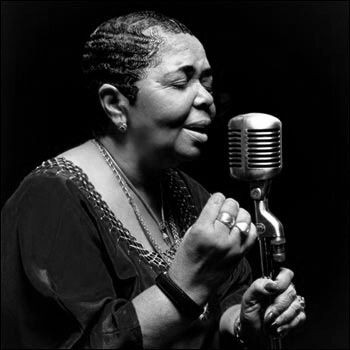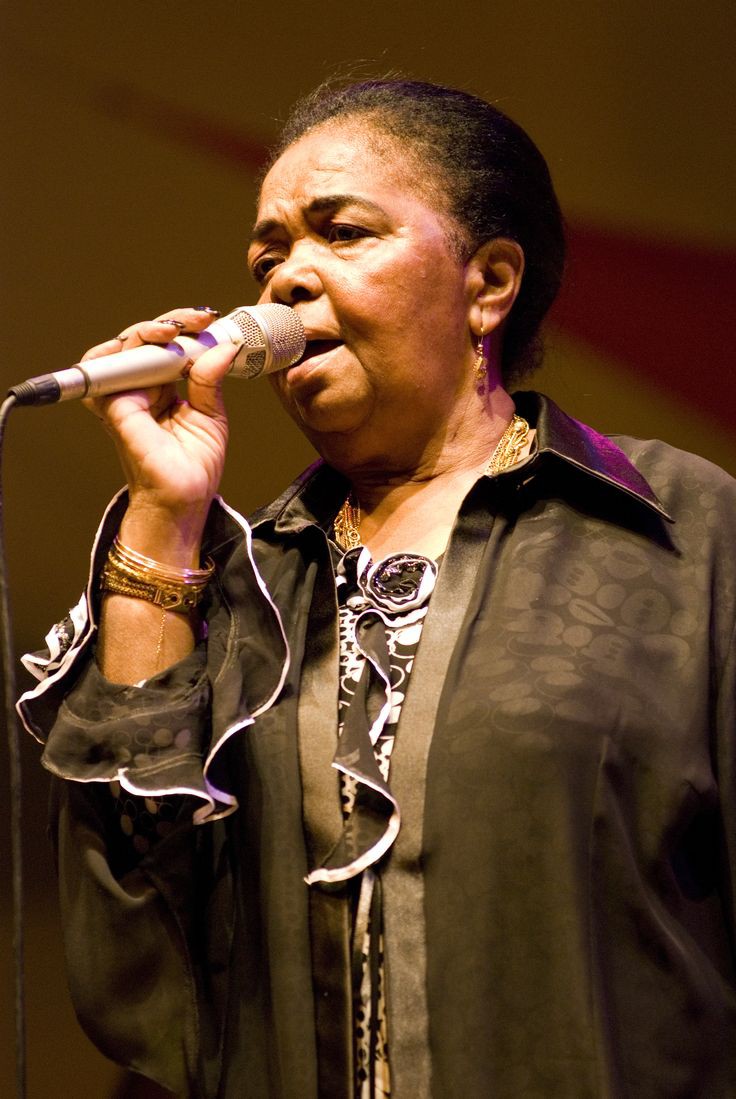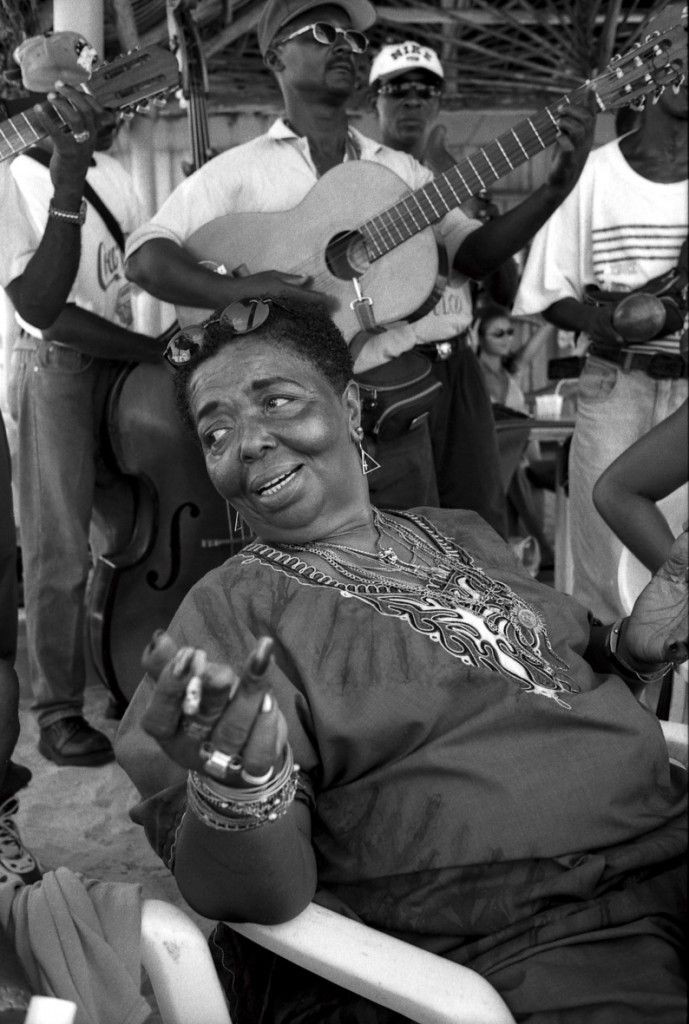Cesária Évora was a Cape Verdean Musician and a legend in African music. She was famous for performing without shoes. The impact of her music is felt across the African continent and beyond.
Moreover, the Grammy winner songs are themed on homesickness, “love relationship”, nostalgia, and the history of her beloved country, Cape Verde. She is known as the Barefoot Diva, Cize, and the Queen of Morna.
She was Cape Verde’s favorite daughter and at some point, the most popular Cape Verdean known globally.

Here Are the Important Things That Happened In The Life Of Cesária Évora;
Early Life
Cesária is from a family of 9, one of 7 children. Her father was a violinist and her mother was a house help and a cook. Cesária lost her father when she was a little girl and her mother had no other choice but to raise her 7 kids all by herself in poverty.
As a result, she could only get a little formal education. She grew up with her grandmother and at age 10, she was moved to an orphanage, as her family found it hard to keep supporting her.
Her Music Career And Family Life
Cesária Évora started music when she was a child. Her music journey started in her mid-teenage years, when she started having an affair with a guitarist who urged and persuaded her to start morna and coladeira performance. She began to do that in bars.
Moreover, she lived in Mindelo, one of the international port towns in Cape Verde and its large nightlife provided Cesária to headline some of the nightlife parties in the city. Her most notable headliner was at the Mindelo’s Café Royal and that led to her performing on Radio Mindelo to a wider audience.
Alongside musician Luis Morais, she started performing nationwide. She also developed a small cult following in the Netherlands at this point, but she didn’t capitalize on it. Évora put down multiple numbers for the radio throughout the 1960s decade and put out two singles as well.
However, she encountered various challenges in her early days in the music game, as she was faced with criticism from those who were for traditional gender roles. They believed the music game was for the male gender in the country.
Furthermore, she was negatively criticized for her multicultural background and social class. As a result of the constant criticism, she expressed her frustrations on these issues in her songs, knowing fully well that the majority of her foreign audience wouldn’t understand it.
Cesária’s marital life didn’t go as well as her early musical career did. She went through three divorces. She gave birth to three children, each to a man. However, 2 of these children only survived to adulthood. She could not support her kids financially and that led to her drinking and depression.
Return To Music, Now Bigger
As a result, she quit music and returned home to her mother. Her problems became worse as her fans in Mindelo started contributing funds for her support. Cesária said that is the “dark years” of her life.
After a long decade of retirement, Évora returned to music in 1985 after she was asked to travel to Portugal and create music for a women’s anthology album. In 1987, she went on a tour in the United States with Bana, a morna singer. Bana requested her to perform at his food establishment in Lisbon. She was discovered by a French music producer José “Djo” da Silva during her performance.

In Paris, she worked with Dominique Buscaï. In 1988, she made her first album, La Diva Aux Pieds Nus (The Barefoot Diva) with the help of da Silva’s record label Lusafrica. She also released Belita’s Destiny (Distino di Belita), and Blue Sea ( Mar Azul) in 1990 and 1991 respectively. However, her first two bodies of work were below-par commercially but Mar Azul came out successful.
Her fourth studio album is Miss Perfumado. It was released in 1992. Miss Perfumado became a success, selling thousands of copies. The album got her large supporters in France and Portugal. She visited Brazil, United States, Canada and some European and African countries during her global tour. That same 1992, she had her major concert at the Théâtre de la Ville in Paris, which she sold out.
Furthermore, with the American label Nonesuch Records, she put out her fifth body of work titled, Cesaria Evora. This album was received better than her previous ones and got her her first Grammy nomination. Over the following years, she released many albums with 2 to 3-year intervals.
Deteriorating Health
Cesária Évora ninth studio album Voz d’Amor earned her a Gramophone at the 2004 Grammys. Unfortunately, she began facing health challenges when she was diagnosed with heart issues. As a result, she suffered a stroke on her Australian tour in 2008 and had to end the tour early. 2 years later, she suffered a heart attack that required a surgical operation.
Cesária Évora retired from music in September 2011 because of her health challenges. 3 months after her retirement, she died in her hometown in Mindelo, at age 70 from hypertension and respiratory failure.
Awards And Honours
Cesária Évora won the “Best Artiste of West Africa” and “Merit of the Jury” at the KORA All African Music Awards. She has 6 Grammy nominations and just won one for her Voz d’amor album in 2004. This album also got her the “Best Music World Album” at the Victoires de la Musique. In addition, she won another “Merit of the Jury” award for her lifetime achievement at the KORA in 2010.
Furthermore, she was an ambassador of the World Food Programme and she was made the cultural ambassador and issued a diplomatic passport of the country by the Cape Verdean government. She also received the Grand-Cross of the Order of Prince Henry in Portugal in the year 1999. In 2009, Cesária Évora was honored with the French Legion of Honour.
Musical Style
Morna is a music genre in Cape Verde that got its inspiration from Portuguese fado and consists of blues elements and other styles of music. Évora performed morna wherever she went. She was nicknamed the “Queen of Morna” and the “Barefoot Diva”. Her music is mostly about love and relationships. She also has songs that talk about homesickness and nostalgia, these two are what is rampant in morna music. Furthermore, her music also sheds light on the broad life of Cape Verdeans and their history of colonialism and slavery.
In addition, she sang in her local language of Cape Verdean Creole, and sometimes in Spanish when she collaborated with Spanish musicians. Her band was full of young men, headed by Nando Andrade. She worked with expansive songwriters like Amandio Cabral, Nando Da Cruz, and Manuel de Novas. Francisco Xavier da Cruz, Évora’s uncle was a songwriter and she performed a lot of his songs too. Her music has been put side by side with Billie Holiday and Edith Piaf.

Her barefoot performance was described as a way to pay homage and respect to the poor. Her manager said “the barefoot diva” person was an opportunity for the team to market her as a brand to the distributors. Although, Évora said the habit was just a reference to her first album, as it also gave her comfort.
She has this maternal image she was known for along with her boubou robe. She was also known to buy old jewelry from people in need and wear them to shows. Cesária Évora wasn’t a fan of false humility. She would tell you she got to the top because she was a good singer.
Legacy
At the peak of her career and fame, Cesária Évora was well known as the best performer of morna in the world. With her fame and popularity, she talked about the Cape Verde story and history. As of 2011, she was described as the most popular Cape Verdean globally.
Furthermore, her influence is shown in Cape Verdean diaspora musicians who sometimes tend to emulate her music style.
It is not only musicians who have Cape Verdean roots that emulate her music, Musicians like Madonna and Brazilian singers have both acknowledged her impact and influence on their music. Madonna’s 2019 album “Madame X” and its tour were influenced by Cesária Évora. In addition, Belgian singer Stromae recorded a song on Évora in 2014.
The Cape Verdean stamps and Postage have Cesária Évora images. She is also on the 2000 Escudos banknotes. The airport in Mindelo was named after her a year later she passed away, Cesária Évora Airport. A 3-metre statue of her by Domingos Luisa is beside the entrance of the airport.
Conclusion
Cesária Évora was a woman who reached great heights in music despite her little education, her poor background, and what life threw at her.
With her music, she transcended borders and generations, becoming an icon in music and an icon of resilience and inspiration to every African.







